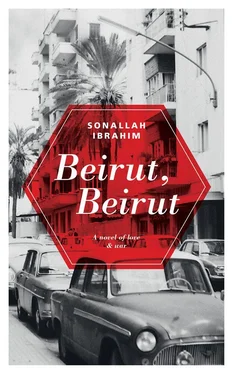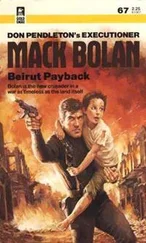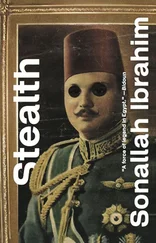Title card:
Fawzia Mustafa Husayn, age 16.
‘‘A child was screaming and crying from hunger, so they asked his mother to quiet him down, but he didn’t quiet down. The Phalangist told her, ‘I’ll make him be quiet. Give him to me.’ He took him from her and threw him far away. He fell to the ground dead. Then he told her: ‘Now he’s quiet.’ ’’
Title card:
Affaf Muhammad, age 32, mother of seven children, three still alive [continued].
“… They brought tall, big trucks to transport families, so the women hurried with their children. Because there were so many people running to the cars, the bigger ones were stampeding over the smaller ones. When I had finished lifting my children onto the truck, I tried to get on, too, but the driver started off. I waved at him to stop and let me on, but he refused, and told me to get on another one. In fact, that’s what I did. I got to the Museum ahead of the truck that had my children. I waited there until the truck came, and they all got off, except for my children. In the end, my twelve-year-old brother got out and my five-year-old son Feisal, and my four-year-old daughter Norma. I asked about the rest of them and my brother said the people on it were stepping on them, which led to the martyrdom of three-year-old Suham and two-year-old Abeer. As for Sonya, who was nine, she got lost, and to this day, I still don’t know where she is, alive or dead. My husband was lost the same way.”
Title card:
Maryam Yaqub, age 45.
‘‘… The day we left the camp, my two children were with me. I told them, ‘Walk in front of us.’ I saw a girl who had been killed, and then I saw my son, killed, along with several young men. I cried and my husband, who is an old man, told me, ‘You’re crying now for our son, and soon enough you’ll be crying for me.’
‘‘At the Hotel School, they searched us, looking for cash and gold. Then the trucks came to take us and the isolationists got into the back of the truck to see if there were any men among the women and children. They took my husband out of the truck, took the money he had on him, and killed him. At another checkpoint, they took the children out of the truck, including my son Muhammad. When I saw the isolationist boarding the truck from the other side, I hid my son underneath me. I sat on him until the truck started moving…’’
Title card:
Randa Ibrahim al-Duqi, age 14.
“… The cats in Tel Zaatar were very fat because they would eat dead bodies. They were dangerous because they would attack people, once they had gotten used to eating them. Our fighters used to shoot at them…”
Title card:
Umm Nabil, age 45, mother of ten sons.
‘‘… I was making dough for bread for the fighters, along with a number of other women from the camp, when I found out that my son Kayid had been martyred. He was twenty-two. So I finished my dough and went to the place where they put his body. I kissed him and left him there, and went back. I didn’t tell his brothers so as not to break their spirits.
‘‘A week later, I learned that my son Faris, who was twenty-five, had been martyred, and I was able to endure it. No mother’s heart has endured more than that, but I willed myself to be strong because I was a source of strength for mothers whose children were martyrs. My son Nabil left the camp through Mount Lebanon, and to this day I don’t know what’s become of him. They assaulted the camp while I was there with my fourteen-year-old son Khalid. They lined up the men, took the girls, and performed intrusive, embarrassing searches on the women. My turn came and they asked me where I got a son like that from, since he had blond hair and green eyes, while I have dark skin. They said, ‘It’s a disgrace for a boy like that to be with the Palestinians.’ I answered back at them in a voice filled with defiance: ‘This boy is Palestinian — he’s my son, a son of Palestine.’ As soon as I finished speaking, they shot him. I showed no emotion, but stood fixed in place. They ordered me to walk over him, but I refused. I told them, ‘I know this is the end, and this is my fate, but we will never kneel, as long as we still have a single nursing baby.’ ’’
Title card:
Maryam Yaqub, age 45 [continued].
“… We stopped at another roadblock and they took us out of the truck to search us. I had a little sugar and salt in a teapot, and a lot of photos of my children and the deeds to our land in Palestine inside a box…”
Title card:
Tharya Qasim, age 48, mother of five.
“… I had a son — God have mercy on his soul. His name was Muhammad and he was around eighteen. He had fire in his belly. He never let the gun out of his hands. But God made it his fate to die a martyr on July 2, 1976, on the field of honor and heroism. About a week later, my other son Ibrahim was martyred. He wasn’t yet fourteen years old. I was very sad. I mourned for them the way any mother would, and also because I no longer had any young men I could offer to fight and defend our honor. My husband is an older man and he’s not in good health.
“As for my daughters, may God protect them, wherever they are. I had three daughters: Lamia, who was twenty, Ayida, who was twenty-two, and Dina, who was seventeen. They used to help at the aid stations, and then they went up into the mountains. To this day, I’ve heard no news, good or bad, about them. I don’t know whether they were martyred or if they’re still alive…”
Title card:
Randa Ibrahim al-Duqi, age 14 [continued].
‘‘… On the last night, we were able to get through to Yasser Arafat on the two-way radio, and we asked him what we should do. He told us: ‘Don’t surrender.’ ’’
Title card:
A woman who didn’t give her name.
“… Tel Zaatar was the last holdout in East Beirut. It was obvious that the isolationists won because they had the support of Syria and Israel, and because Tel Zaatar was cut off from our areas. An early surrender could have been negotiated. But instead, more than 2,000 Palestinians and Lebanese were martyred unnecessarily.”
Title card:
Watifa Shahada Dahir, age 35, mother of seven.
“It was obvious to everybody the camp would fall, because there were more martyred and wounded than there were fighters. Our brothers in West Beirut didn’t send us a single fighter or ammunition for the artillery and other weapons to replace what we lost in over fifty-eight attacks by the isolationists.”
Title card:
Nuzha Hasan al-Duqi, age 65, mother of five sons and grandmother of ten [continued].
‘‘… What did we do wrong, Miss? I don’t know. What did we do wrong, that we have to die to return to our land? Is that so wrong? What do they want from us… Make us disappear?’’
Jacques LeRot and his wife welcomed us warmly. With a laugh, he began repeatedly welcoming us in Arabic: “ Ahleen … ahleen. ”
He was of medium build, like most Frenchmen, around thirty-five, with a sardonic look beaming from his smiling eyes, and always laughing for no apparent reason. His wife had a full head of black hair, and looked older than he was.
They walked us to a spacious room lit by side-table lamps. I shook hands with Marwan, the one with the thick mustache, and his friend the film director, and another young man with a thick beard that covered his entire face.
I sat down in a comfortable chair with polished wooden armrests. Grinning, Jacques addressed me in perfect Arabic that had no trace of a foreign accent: “We’re always bumping into each other.”
“The last time you were studying the minarets of Cairo,” I replied.
He laughed out loud. “Now I’m studying the Lebanese dialect,” he said.
Читать дальше












